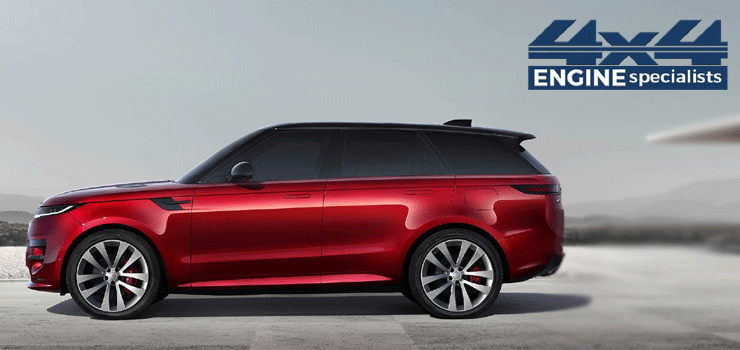The 2023 Range Rover Sport is one of the most anticipated luxury SUVs of the year. It promises to deliver a refined and powerful driving experience, with a sleek design and a spacious interior. But what makes this model stand out from the rest is its engine choice: a BMW V8.
Why did Land Rover decide to use a BMW V8 instead of developing its own engine or using another option? In this article, we will explore the reasons behind this decision and what it means for the performance, efficiency and reliability of the 2023 Range Rover Sport.
The history of Land Rover and BMW
Land Rover and BMW have a long history of collaboration. In 1994, BMW acquired Land Rover from British Aerospace, and became its parent company until 2000, when it sold it to Ford. During this period, BMW invested heavily in Land Rover’s development, and introduced several innovations, such as the Range Rover P38A, the Freelander and the Discovery Series II.
BMW also supplied Land Rover with some of its engines, such as the 4.4-liter V8 that powered the Range Rover L322 from 2002 to 2005, and the 3.0-liter inline-six diesel that was used in the Range Rover Sport from 2005 to 2009. These engines were praised for their smoothness, power and refinement, and helped Land Rover establish its reputation as a premium SUV brand.
The benefits of using a BMW V8
In 2019, Land Rover announced that it had signed a new deal with BMW to source its V8 engines for its future models. This was seen as a strategic move, as Land Rover was facing several challenges with its own engine production. For one thing, Land Rover’s V8 plant in Wolverhampton was nearing its capacity limit, and expanding it would require a significant investment. For another thing, Land Rover’s V8 engines were not very competitive in terms of emissions and fuel economy, especially in light of the stricter regulations in Europe and China.
By using a BMW V8, Land Rover could benefit from several advantages. First of all, BMW’s V8 engines are widely regarded as some of the best in the industry, offering a balance of performance, efficiency and reliability. They are also modular, meaning that they can be adapted to different models and specifications. For example, the 2023 Range Rover Sport will use a 4.4-liter twin-turbocharged V8 that produces 523 horsepower and 553 pound-feet of torque, while the upcoming Range Rover SVR will use a more powerful version that delivers 600 horsepower and 590 pound-feet of torque.
Secondly, using a BMW V8 could help Land Rover reduce its development costs and time, as well as its emissions and fuel consumption. By outsourcing its engine production to BMW, Land Rover could focus more on other aspects of its vehicles, such as design, technology and quality. Moreover, BMW’s V8 engines are more efficient than Land Rover’s own engines, thanks to features such as variable valve timing, direct injection and cylinder deactivation. This could help Land Rover meet the environmental standards in different markets and improve its customers’ satisfaction.
The drawbacks of using a BMW V8
Of course, using a BMW V8 also has some drawbacks for Land Rover. One of them is the loss of exclusivity and identity. Some critics argue that by using a BMW engine, Land Rover is compromising its brand image and heritage, and becoming more dependent on another company. They claim that Land Rover should develop its own engines that reflect its values and character, rather than relying on someone else’s technology.
Another drawback is the potential risk of compatibility issues and quality problems. While BMW’s V8 engines are generally reliable, they are not immune to faults and failures. For instance, some owners of BMW vehicles have reported issues such as oil leaks, coolant leaks, timing chain failures and carbon buildup. These issues could affect Land Rover’s vehicles as well, if they use the same engines. Moreover, integrating a BMW engine into a Land Rover vehicle could pose some challenges in terms of calibration, tuning and cooling.
The future of Land Rover and BMW
Despite these drawbacks, using a BMW V8 seems to be a smart decision for Land Rover in the short term. It allows Land Rover to offer its customers a high-performance and high-quality SUV that can compete with other luxury brands in the market. It also gives Land Rover some time to develop its own engine solutions for the long term.
Land Rover has already announced that it is working on developing its own hybrid and electric powertrains for its future models. By 2030, Land Rover aims to have all its vehicles electrified in some form or another. This means that the BMW V8 could be one of the last internal combustion engines that Land Rover uses in its vehicles.
FAQs
Why did Range Rover choose the BMW V8 over other engines?
The decision was based on a collaborative process that considered factors such as performance, reliability, and shared technological vision.
What advantages does the BMW V8 offer in terms of performance?
The BMW V8 is renowned for its power, efficiency, and an exhilarating driving experience, setting new standards in automotive performance.
How will this decision affect potential buyers?
Buyers can expect an enhanced driving experience, aligning with the luxury and performance standards set by Range Rover.
Are there any criticisms or concerns regarding the engine choice?
The article addresses potential criticisms transparently, providing insight into the decision-making process.
What does the future hold for Range Rover and its engine choices?
Speculation on future models and potential industry trends is discussed, offering a glimpse into what lies ahead.


